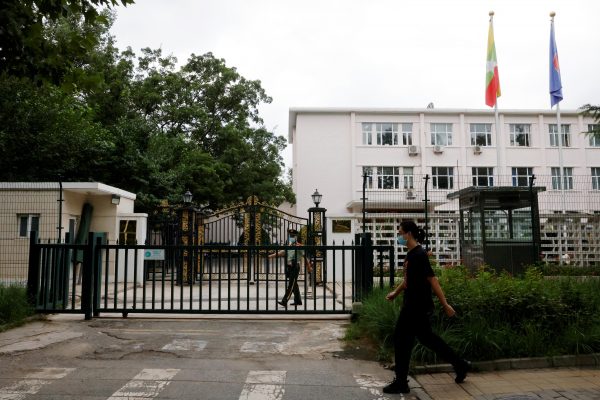Part of the deal for respectability in ASEAN is to focus on practical and reasonable steps to achieve agreed outcomes. Myanmar now fails every time.
Such failure means Myanmar is a problem for China’s leaders too, who have been watching closely since the 2021 military coup. China’s foreign policy establishment and analysts think deeply about the opportunities and risks of future scenarios across Southeast Asia.
It should not be forgotten that former leader Aung San Suu Kyi’s deposed government in Myanmar was in key respects a useful partner for China’s regional ambitions. The coup was probably judged an unhelpful complication.
For Chinese strategists, a primary consideration is access to the Indian Ocean. That access made it possible for China to import around US$1.5 billion of natural gas in 2022 from the Rakhine State coast, across central Myanmar, up through Myanmar’s mountainous Shan State and to Yunnan province in China. In a future regional security crisis, where maritime access was in doubt, Myanmar might also allow valuable ‘back door’ access for China to friendly ports on the Bay of Bengal.
With such scenarios in mind, the economic relativities of the Myanmar–China relationship are worth considering. According to 2021 World Bank data, Myanmar’s nominal GDP was US$65 billion (US$1200 per capita), while China’s was US$17.73 trillion (US$12,200 per capita). To put Myanmar’s poverty in perspective, if it were a Chinese province, its economy would be the third smallest. It would only best two of China’s remote landlocked regions, Tibet and Qinghai — which are both still at least five times richer per capita.
Yunnan — the Chinese province neighbouring Myanmar, and with many geographical and cultural commonalities — has a GDP of around $430 billion a year. This is over six times larger than Myanmar’s, and around nine times more on a per capita basis.
With such incredible disparity in wealth, anti-Chinese politics in Myanmar, while usually only a fringe issue, can ignite quickly given local resentment against Myanmar’s commercially successful ethnic Chinese minority. This old story, replayed around Southeast Asia over centuries, is a fact of life for Chinese diplomats seeking to build relationships that offer mutual benefit.
With China a significant supplier of weapons and training to Myanmar government forces, and also to some ethnic armies, it is entangled in the country’s politics in ways that are both profitable and problematic. Exactly how much of this involvement is centrally planned in Beijing is an open question. Yunnanese authorities have a habit of seeking local solutions through the often unruly borderlands.
Under President Xi Jinping, Chinese diplomacy has yet to get much momentum for its ‘peacemaking’ activities in such a contested environment. More than two years after the coup, China’s Foreign Minister Qin Gang recently met with Myanmar Senior General Min Aung Hlaing, becoming the highest-ranking Chinese official to meet with the coup leader.
With more high-level engagement likely soon, the question of how China can encourage positive outcomes for Myanmar requires a focus on its core interests. While Myanmar’s economic growth until the coup was advantageous, the fact that the coup leaders are almost friendless — and despised even in ASEAN — offers different upside.
For now, China can harness the Myanmar military’s appetite for attack aircraft, heavy weapons and constant resupply of ammunition and technical equipment to bolster its role as the patron-in-chief. Russia has traditionally taken a similar approach. For Beijing and Moscow, Myanmar is part of a convenient global constellation of countries pushed to the outer edge of the international system.
Whatever its short-term strategy, it would help China’s standing in ASEAN, and even in countries like Australia, if it showed a creative instinct to use its wealth and influence to broker better outcomes for the people of Myanmar.
The fear is that China will instead continue to manipulate Myanmar’s impoverished and downtrodden status while fuelling, through its lucrative weapons exports, some of the most atrocious violence seen in Southeast Asia for generations.
When the dust finally settles in Myanmar, its people will rightly ask who sustained the reviled military regime. Right now, the answer is that Beijing offered ‘friendship’ to the coup-makers, an irony for a Communist Party so committed to regime and institutional stability.
Yet with the right attention to China’s role and self-interests, it is still possible to imagine shifting positions, where Chinese institutions eventually work out how to negotiate a more peaceful settlement. At a time when China talks regularly about peace in European, Middle Eastern and African conflict zones, a positive contribution in Myanmar would be welcomed by all.
Nicholas Farrelly is Professor and Head of Social Sciences at the University of Tasmania. From 2015–18, he was the ANU Myanmar Research Centre’s inaugural Director. He has researched the country’s politics for over 20 years.

